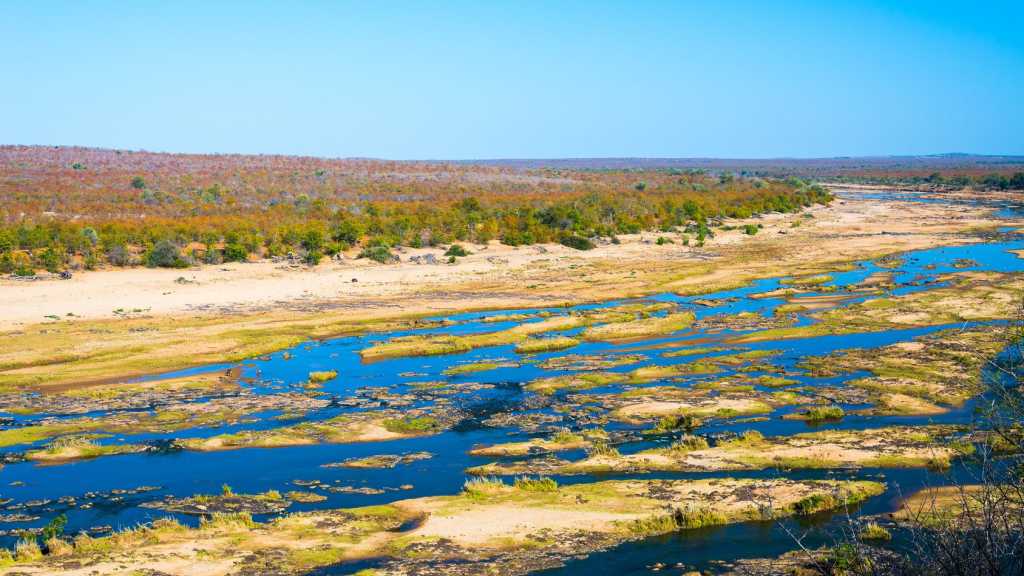At the Centre, from Orpen Gate to Letaba, the landscape has more pastures and attracts impalas, zebras, wildebeests, giraffes and black rhinos. This is the most suitable place for lions and cheetahs! There are certainly fewer choices in restcamps but they present exceptional locations.
The surrounding private game reserves (Karongwe, Makalali, Balule, Kapama, Thornybush ...) have been annexed to the Kruger Park and form the "Greater Kruger". They offer a large choice of accommodations.
At the extreme north-east of the country, this national park, as big as two and half time of Corsica, is one of the most renowned of the globe. There is all the wildlife of the savannahs: impala, buffaloes, zebras, Cape elands, warthogs, cheetahs, kudu, giraffes, hippos… and this park is one of the lasts to house the famous " Big Five": lion, leopard, rhinoceros, buffalo, elephant.
The animals are observed by the thousands in the different regions of the park but also in the numerous private concessions bordering its western part.
Several days or stays in the Kruger are necessary to explore the whole… if you only have a few days, it’s better to stay in one area and enjoy!
Advice:
- The rest camps are very popular especially during the European holidays, plan well in advance if you desire to stay inside the park.
- Small towns bordering the park like Phalaborwa, Hazyview, Malelane… have an excellent choice of accommodation at different levels of range… it’s a great way to explore the park even though a night in the rest camp is an experience no to be missed!
- Be realistic, you won’t be able to explore the entire park in one stay then, aim for an area (South, Centre, North) or a combination of two of them… the park deserves more than a flash passage and the speed is in any case limited to 50km/h.
- The "must": a stay in one of the lodges of Sabi-Sand offers almost a guarantee to see them! Who? The Big 5 of course!
- The regions of Tzaneen and Louis Trichardt deserve a stop of more than one night on the way to the Kruger or when coming back.
- For the safaris, opt for comfortable clothing, dark colours and neutral (khaki) to blend in the natural environment.
South Africa, the 'rainbow' nation.
South Africa is so diverse you feel like you are visiting several countries in one trip!
With grandiose and various landscapes (mountains, « bush », beaches, forests, plains, desert), a pleasant climate in all seasons, an abundant and diversified fauna and flora including the “Big Five”, a population with the most composite ethnic groups, South Africa accumulates important natural wealth. Also note among its assets: quality of the hotel sector, services, road network, means of transport, rich and varied gastronomy, excellent wines, favourable exchange rates, 21 national parks and many private reserves, a multitude of activity throughout the country…
When to go?
South Africa has this peculiarity of presenting a wide variety of climates: Mediterranean, subtropical or temperate depending on the region with a high rate of sunshine everywhere (watch out for sunburn!)
South Africa can be visited all year round with more favourable periods depending on interests:
-
June, July and August (South African winter) for animals and therefore preferably the North of the country.
-
September and October: best times for flowers (Namaqualand) but very good for game drives as well.
-
From November to March (South African summer): best time to enjoy the South and East of the country, beaches of the Cape and the Indian Ocean. The Garden Route is particularly appreciated in February: the weather is nice; the temperature of the water is pleasant.
-
April and May: very pleasant autumn with always nice days in Cape Town and the resumption of the animal season.
Formalities:
The passport must include two blank pages and still be valid for 30 days after the expected date of exit from South Africa.
French nationals are exempted from prior visas. A 90-day residence permit will be issued at the border on entry into South African territory.
For other nationalities, inquire on a case-by-case basis with the competent authorities of their country of origin.
For any minor child: a multilingual extract of birth certificate (or an unabridged birth certificate translated into English - certified translation) is required to enter and leave South Africa (in the case of a child traveling with his 2 parents). Please consult the official sites for more information about all the requested documents according to your case.
Health:
No vaccinations are required for entry into South Africa. However, it is advisable to check the updating of your usual reminders and vaccinations as for any country.
Anti-malarial treatment is recommended (see your doctor).
Currency:
The Rand is the official currency of South Africa (symbol: ZAR). Credit cards are accepted everywhere and distributors are easily available for cash withdrawal. Travellers’ checks in euros are also accepted in banks and some hotels.
